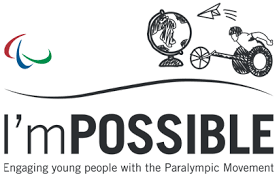
The Paralympic symbol, the Agitos, sits next to the word I’mPOSSIBLE, with ‘POSSIBLE’ in bold to resonate strongly with its targeted young audience. The programme’s rebrand also comes with a strong call to action to “Learn. Engage. Include.“ By engaging with future generations in the history and values of the Paralympic Movement in classrooms, youngsters will change their attitudes about disability. With an inclusive mindset, they would lead a cultural shift in society and be examples of the IPC’s brand narrative “Change Starts with Sport.”
Coinciding with the United Nations’ International Day of Persons with Disabilities (3 December), I’mPOSSIBLE’s rebrand not only signifies a successful three years since implementation, but also the next stage of integrating youngsters into the IPC’s vision for a more inclusive society through Para sports.
Three-time Paralympic gold medallist from Japan Miki Matheson has been associated with I’mPOSSIBLE since its early stages and said: “In order to expand the knowledge and understanding of the Paralympic Movement, the power of education is essential. Young people are our future, and if these young people grow up with an inclusive mindset, the concept of inclusiveness will be applied to the things they make, the rules they set, the services they provide, etc. As a result, an inclusive society will gradually be formed, bringing us closer to a society that will leave no one behind.”
Since the programme’s launch on this day in 2017, I’mPOSSIBLE has aimed to promote social inclusion by raising awareness of the Paralympic Movement, starting in the classrooms. It has provided resources, lesson plans, worksheets and inspirational videos to teachers and their students, seeking to change perceptions about people with an impairment and inspire the next generation through the Paralympic values.

ⒸI’mPOSSIBLE Task Force in Japan
FROM PILOT PROJECT TO WORLDWIDE
The pioneering education project was piloted in Armenia, Colombia and Japan. To this day, it is being implemented in 37 countries across all five regions.
The early implementation in Japan was fitting in the build-up to the Tokyo 2020 Paralympic Games. Funded by the Nippon Foundation Paralympic Support Centre (NFPSC), the Japanese-translated material of I’mPOSSIBLE was created with the support of the Japanese Paralympic Committee (JPC).
“It is said that the Paralympics have the power to change society, but some people had a hard time understanding how to link the Paralympics and social change, and I’mPOSSIBLE explains this clearly,” Matheson recalled. “As the host country of the Paralympics, I feel that by instilling this mindset into the preparations for the Games, there has also been a change in the media coverage of the Paralympics. I feel that there is a bigger understanding that the Paralympics are not just a sporting event; they have bigger aspiration.”
To this day, I’mPOSSIBLE is round the globe, from Aruba to Cameroon, from Bhutan to Saudi Arabia, and Australia to Estonia.
“In the three years since its launch, the understanding of the Movement and the concept of inclusion has spread to 37 countries, which is great. The more countries that use I'mPOSSIBLE, the faster we can get closer to achieving an inclusive world, and we want to involve more and more teachers.”
EDUCATING DURING COVID
I’mPOSSIBLE was the initiative led by the IPC’s development arm the Agitos Foundation. Since July 2020, the IPC brought back in-house the delivery of the Agitos Foundation’s programmes to improve efficiencies and boost development activities provided to IPC members. And with that, I’mPOSSIBLE.
The move proved effective particularly during a challenging year due to the COVID-19 pandemic.
In November, the IPC partnered with Loughborough University and the University of Malawi, Chancellor College on a collaborative project Para Sport Against Stigma. The aim is to overcome stigma and discrimination against persons with disabilities in Africa.
An I’mPOSSIBLE Educator Course held online was among the first activities to take place as part of this partnership. It saw six participants from Ghana, Malawi and Zambia become certified I’mPOSSIBLE Educators, with next steps in for them to deliver I’mPOSSIBLE training to teachers in their respective country.
In partnership with United Through Sports (UTS), the IPC supported the UTS World Virtual Youth Festival 2020 held in late November. During the two-day festival, an I’mPOSSIBLE workshop was held, which saw 1,500 participants.
Activities held in Australia, Japan and Singapore also saw schools continue finding innovative ways to teach schoolchildren about the Paralympic Movement and values digitally.
On another scale, Olympic and Paralympic Organising Committees have also been applying I’mPOSSIBLE as part of their education programmes. In September 2020, Beijing 2022 created a Chinese version of I’mPOSSIBLE to engage with the country’s young people. And for the first time, the I’mPOSSIBLE Award will be granted during the Closing Ceremony of the Tokyo 2020 Paralympic Games in 2021 to schools and Paralympians who are making significant contributions to a more inclusive society.
“In three years, we have laid a solid foundation for the spread of I'mPOSSIBLE and the building of an inclusive world,” Matheson said. “What is important is that we don't stop moving forward and continue to build an even bigger Movement, so that when we look back in five or ten years from now, we will be able to say, ‘I'm POSSIBLE.’”










Add new comment